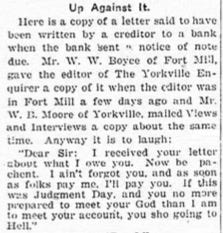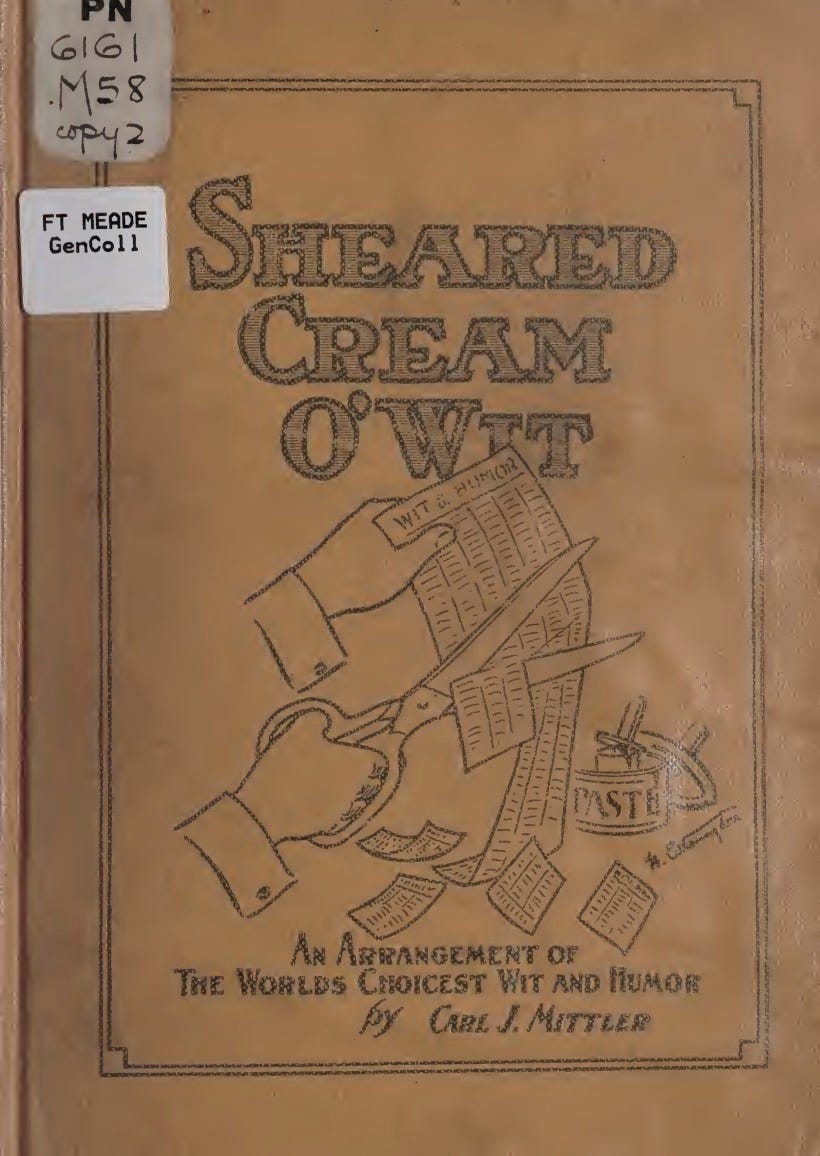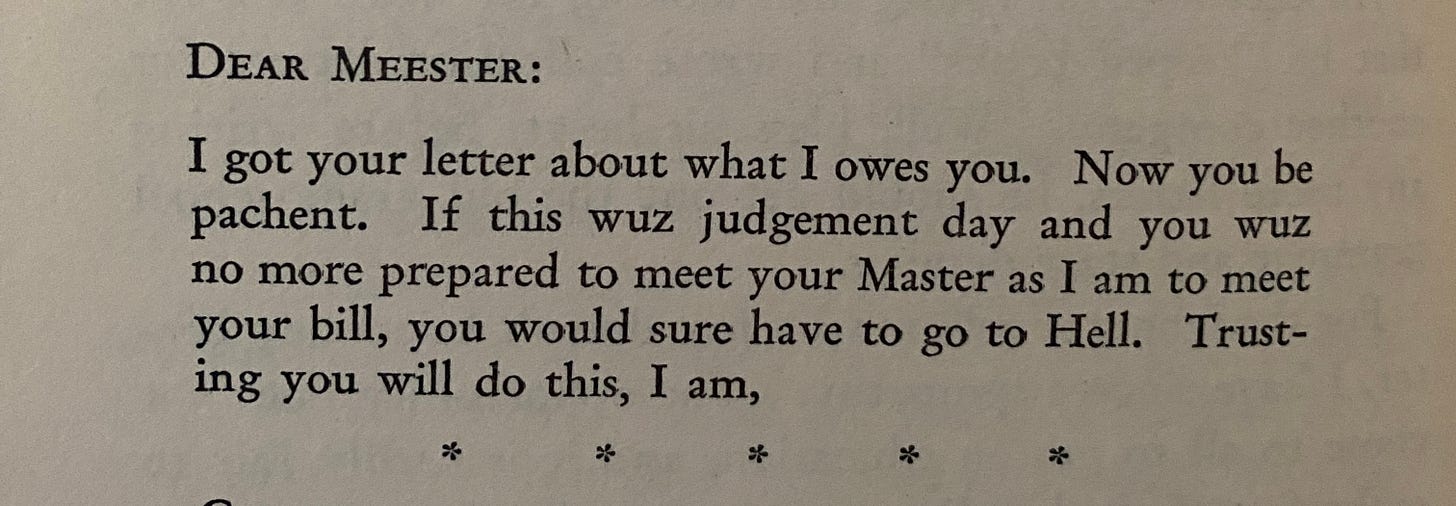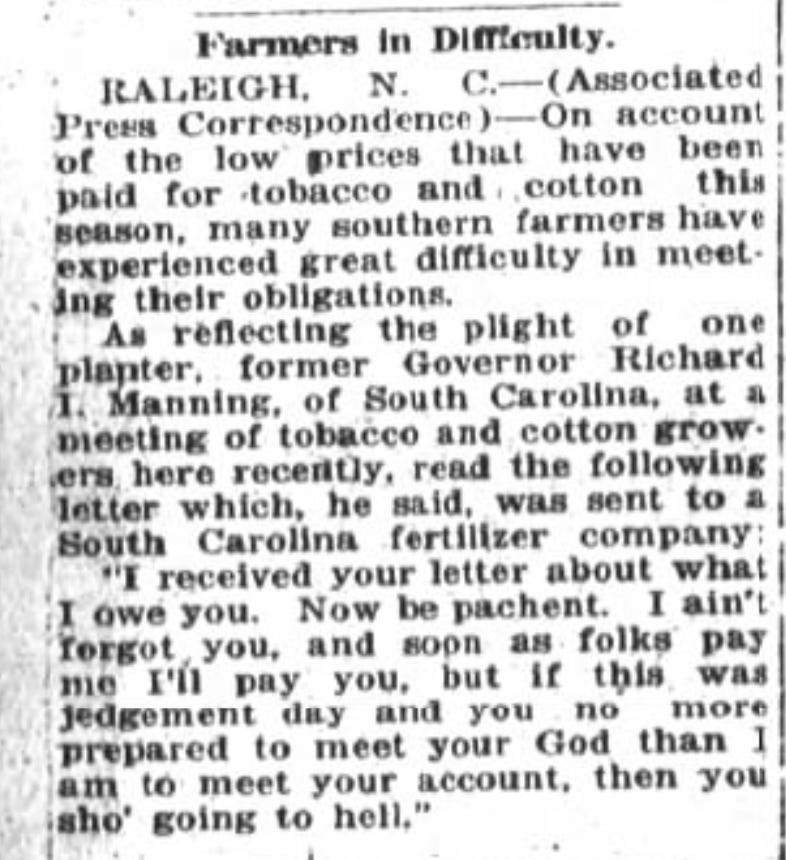Smooth Sailing and Sheared Wit
The history of a 1920s complaint letter that went viral
In the interview my uncle did with my grandma about the letters that make up Dear Mister Ward she talks about the training Montgomery Ward provided to teach correspondence about letter writing. A man named L.E. Frailey, known mostly as Sy, led a workshop at the office based largely on his book Smooth Sailing. So, of course I had to track down a copy of the book.
For a business instructional guide it’s pretty entertaining and it isn’t hard to see why Frailey was such a successful speaker. He wrote several other books and even recorded a couple of audio recordings.
I’ll be writing more about the book and posting some audio clips from the records in a later post but there’s one thing I found which deserved it’s own post.
For anyone who has read Dear Mister Ward this letter might look familiar.
This is what my grandma had saved.
I definitely had my suspicions that Mr. Hans Jones might not have been the actual name of a customer. However, it was quite a surprise to find this in the book.
My first response was “It’s a fake!” but then I remembered that my grandma never intended to make a historical document. She just saved some things she thought were funny. Maybe she wrote down this letter during the seminar, or maybe the guy in Chicago she swapped letters with gave it to her.
Or maybe there’s more to the story.
I was curious the other day so I googled some phrases from the letter. After all, Frailey had to get the letter from somewhere. Right away I found a handful of other places it had been published.
The earliest instance I found through Google was in the Yorkville Enquirer (York, SC) edition from Friday February 4th, 1921.

I also found it published in a collection of humorous clippings from newspapers called Sheared Cream o’ Wit by Karl K Mittler published in 1923.

But that was just the beginning. My interest was piqued so I expanded my search to archive.org, newspapers.com and The Library of Congress’s site Chronicling America.
I thought maybe I would find a few more times it had been published. I did not however expect to find over 400 dating from 1921 all the way into the 50s. I found it in several books of jokes and toasts, many internal company publications (or “house organs” as they were known), yearbooks, and school papers.
It turns out it dated back even further than the Yorkville Enquirer publication. At least as far as January of 1921.
The earliest reference I found was in the Abbeville Press and Banner from Abbeville, South Carolina on January 12th, 1921.
Future publications added new details that the letter had been written by a Lexington County farmer to a Columbia, South Carolina based “fertilizer shipper.”
By the end of January it had been submitted so many times to one syndicated columnist that he included this instead of the letter.
A “wheeze” was essentially the term for viral content at the time. Usually it was a joke, toast, story, or proverb that had become overused.
Apparently the overexposure of this letter didn’t stop business leaders and politicians from including it in their speeches.
In early 1921 the former Governor of South Carolina Richard Irvine Manning III gave a presentation at a “meeting of tobacco and cotton growers” about an export and import plan for which he was an advocate. The coverage from the Raleigh News and Observer (January 14, 1921) did not mention the letter but the Associated Press covered it as well and it was mentioned as far away as Fort Wayne, Indiana.
It is unclear if this “meeting of tobacco and cotton growers” was the one mentioned in the January 14th coverage. It’s certainly possible that he gave the speech multiple times. If, however the January 12th meeting was the one being referenced then that would mean he had read the letter before the earliest publication I could find.
Did he just make it up or did someone actually give him the letter? There’s no way to know for sure.
Over the next decade the letter was printed at least 50 times. Probably many more as my search was limited to the three databases previously mentioned. The letters were supposedly received by a variety of business interests including manufacturing companies, local dry goods companies, railroads, bankers, the local land department, newspapers and “a well known wholesale merchant.” The letters were supposed to have been written by a variety of people including a debtor, a Canadian potato grower, delinquent newspaper subscribers, and disparagingly by an “Italian laborer” in New Orleans and “Maori” in New Zealand papers respectively.
I checked a few of the businesses and individuals listed and some of them did actually exist. So, while it’s possible newspapers were just printing it to fill up column inches it seems more likely that people were copying the letter or clipping it from newspapers and then sending it to creditors instead of a serious response.
In fact this was suggested by The Daily Times of Davenport, Iowa which published it on January 4th 1928.
It also made it back into another speech by Patrick Ashley Cooper, the president of the Hudson Bay Company. The first reference I found to him reading it at an event in April of 1932. This story was also picked up by the Associated Press and reprinted many times.
It then went on to be published hundreds of more times well into the 1950s, in papers from as far away as India, England and as mentioned previously New Zealand.
So, by the time it made it into Sy Frailey’s book and presentation it had already been distributed all over the world.
So, did my grandma copy it down during that seminar or did someone use it as a form letter and send it into Wards?
There’s no way to know but at least one columnist was certain that it was not what it seemed. This response was reprinted in the Edmonton Journal on June 11th, 1932 from the New York Sun, based on an account in the London Morning Post.
If the uncredited writer of this response is correct then maybe it was never a legitimate letter after all. I can’t help but think it may have been an elaborate joke from the beginning. Maybe the choice was made as a fertilizer shipping company was a sly reference to the letter being bulls**t.











